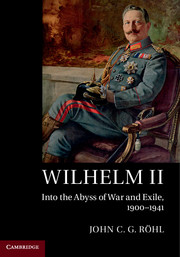by CHRISTOPHER CLARK
 Wilhelm II: Into the Abyss of War and Exile, 1900-41 by John Röhl, translated by Sheila de Bellaigue and Roy Bridge. Cambridge, 1562 pp, £45.00 IMAGE/Cambridge University Press
Wilhelm II: Into the Abyss of War and Exile, 1900-41 by John Röhl, translated by Sheila de Bellaigue and Roy Bridge. Cambridge, 1562 pp, £45.00 IMAGE/Cambridge University Press
In January 1904, King Leopold II of Belgium was invited to Berlin to attend a birthday dinner for Kaiser Wilhelm II. The two monarchs were seated next to each other and everything was going nicely until the Kaiser suddenly brought up the question of a possible future French attack on Germany. In the event of a war between Germany and France, Wilhelm explained, he would expect the Belgians to side with Germany. So long as they agreed, he would see to it personally that Belgium was rewarded after the conclusion of hostilities with territories annexed from northern France. Leopold himself, he added, warming to his theme, could expect to be rewarded with ‘the Crown of Old Burgundy’. When the king of the Belgians, unsettled by these speculations, countered that the ministers and parliament of his country were hardly likely to approve of such far-flung plans, Wilhelm became flustered. He couldn’t respect a king, he said, who felt himself answerable to ministers and parliament rather than to God alone. ‘I will not be trifled with!’ he snapped. ‘As a soldier, I belong to the school of Frederick the Great, to the school of Napoleon. If Belgium does not go with me, I will be guided solely by strategic considerations.’ Leopold is reported to have been so upset by the exchange that, on rising from the table, he put his helmet on backwards.
The career of the last German Kaiser is littered with effusions of this kind. They range from the gross and offensive to the bizarre or merely foolish. Wilhelm II spent most of his waking hours talking, arguing, shouting, speechifying, preaching, threatening and generally unbosoming himself of his latest preoccupations to whoever happened to be within earshot. He was like a Tourette’s tic at the heart of the German state executive. Even when he made the utmost effort to restrain himself, the indiscretions kept slipping out.
The summit meetings between the German and Russian leaderships at Baltic Port (now the Estonian town of Paldiski) in the summer of 1912 are a case in point. The German ambassador in St Petersburg had advised the Kaiser to avoid tendentious topics and to adopt a ‘listening attitude’ wherever possible. For the most part Wilhelm succeeded in reining himself in. But after a lunch on board the Russian imperial yacht Standart, the Kaiser drew the Russian foreign minister aside and spoke to him – or rather at him – for more than an hour about his relationship with his parents, who, he said, had never loved him. Sergei Sazonov later recalled this as an illustration of the German emperor’s ‘marked tendency to overshoot the boundaries of the reserve and dignity that one would expect of someone in such an elevated position’.
On the second day of the visit, during a tour in crippling heat of the ruined fortifications constructed around the port by Peter the Great, Wilhelm again forgot his instructions and buttonholed the Russian prime minister, Vladimir Kokovtsov, on one of his latest hobby-horses, the need to establish a pan-European oil trust to compete with American Standard Oil. The conversation, Kokovtsov recalled, ‘became extremely animated’:
The sun was scorching. The tsar did not want to interrupt our conversation, but behind Emperor Wilhelm’s back he made signs of impatience to me. The Kaiser, however, continued to answer my arguments with increasing fervour. Finally the tsar seemed to lose all patience, approached us, and began to listen to our conversation, whereupon Emperor Wilhelm turned to him with the following words (in French): ‘Your Chairman of the Council does not sympathise with my ideas, and I do not want to permit him to remain unconvinced. I want you to allow me to prove my point with data collected at Berlin, and when I am ready I should like to have your permission to resume this conversation with him.’
London Review of Books for more
